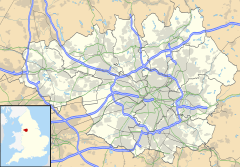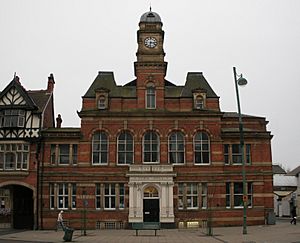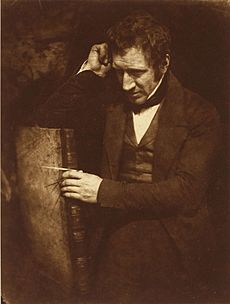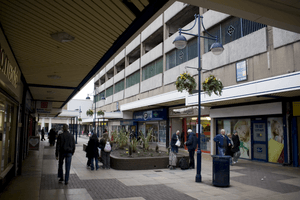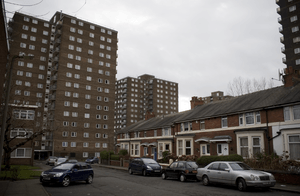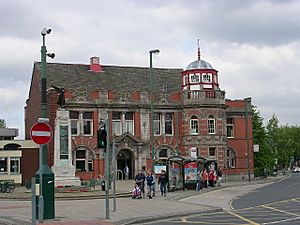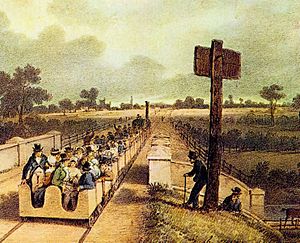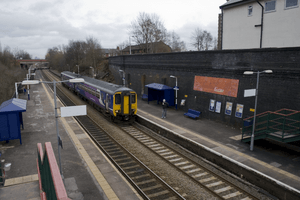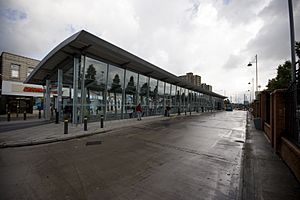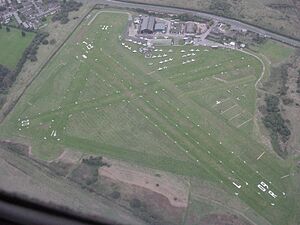Eccles, Greater Manchester facts for kids
Quick facts for kids Eccles |
|
|---|---|
 Eccles Cross |
|
| Population | 38,756 (2011 Census) |
| OS grid reference | SJ778986 |
| • London | 165 mi (266 km) SE |
| Metropolitan borough | |
| Metropolitan county | |
| Region | |
| Country | England |
| Sovereign state | United Kingdom |
| Post town | MANCHESTER |
| Postcode district | M30 |
| Dialling code | 0161 |
| Police | Greater Manchester |
| Fire | Greater Manchester |
| Ambulance | North West |
| EU Parliament | North West England |
| UK Parliament |
|
Eccles is a market town in the City of Salford in Greater Manchester, England. It is about 3 miles (4.8 km) west of Salford and 4 miles (6.4 km) west of Manchester. The town is split by the M602 motorway and has the Manchester Ship Canal to its south. Eccles is famous for the delicious Eccles cake.
Eccles grew around its Parish Church of St Mary, which was built in the 13th century. People lived here even before recorded history. However, the area was mostly farmland until the Industrial Revolution. This was when factories started making textiles in the town. The arrival of the Liverpool and Manchester Railway helped Eccles grow a lot, as it was on the route between these two big cities.
Contents
History of Eccles
What's in a Name?
The name Eccles might come from an old British word, Ecles or Eglys. This word means 'church' in Welsh. When the Anglo-Saxons arrived in Lancashire around 613 AD, they kept many local place names. So, Eccles might have been a village built around an old church.
Another idea is that the name comes from an Old English word, æc-læas. This means 'oak pasture'. This is similar to how Eccles in Kent got its name.
Early Times in Eccles
People have lived in the Eccles area for a very long time. Tools like dugout boats, arrowheads, and axes have been found. These suggest that people were hunting and traveling here as far back as 6000 BC. There were also settlements on Chat Moss around 500 BC and during the Roman-British period.
The village might have been started by people escaping from Manchester (called Mamucium) in the early 4th century. However, it seems Manchester's civilian area was empty by the mid-3rd century. During the Dark Ages, Eccles was quite isolated. It was not much affected by local fights, but it welcomed new people from nearby towns.
The area was once part of a large estate called the Manor of Barton upon Irwell. This manor included many smaller towns like Eccles. The Barton family first controlled it, then the Booth family, and later the Trafford family. In 1632, the Trafford family settled at Whittleswick, which they renamed Trafford Park.
Eccles parish included several townships. By the end of the Middle Ages, about 4,000 people lived there. Farming was very important, growing oats and barley. Local people also had small businesses. These included blacksmiths, butchers, thatching, and weaving linen and wool.
The English Civil War did not affect Eccles much. Troops passed through sometimes, and there was a small fight at Woolden. The Jacobite army also marched through in 1745.
Industry and Revolution
In the 18th century, making textiles was a big part of life in Eccles. Records from 1807 show that many fathers were weavers. People made cotton goods at home. Later, factories started to appear. By 1835, 1,124 people worked in cotton mills. Some mills even used new power looms.
Eccles also became known for making silk. Many factory workers were children under 12 years old.
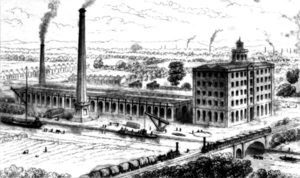
In 1830, James Nasmyth visited the new Liverpool and Manchester Railway. He saw a good spot for an engineering factory next to the canal at Patricroft. He opened the Bridgewater Foundry there in 1836. In 1839, Nasmyth invented the steam hammer. This machine made it possible to create large metal parts much faster. The foundry also built 109 railway locomotives by 1853.
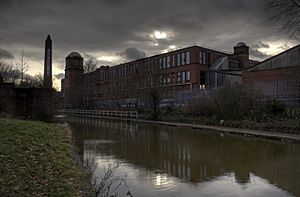
The Eccles Spinning and Manufacturing Company opened a new mill in 1906. This was after two earlier mills burned down, causing many people to lose their jobs. The new mill was very impressive, with a tall spinning section and weaving sheds.
Early homes in Eccles were thatched cottages near the church. As more workers came, there was a big demand for housing. New homes were often built very close together, leading to overcrowding. In 1852, streets were paved with stones, and there was no proper sewage system. Water came from local wells. Later in the 1800s, new housing estates were built for wealthier residents.
The building of the Manchester Ship Canal created many jobs. About 1,888 people worked on the section near Barton. An old stone aqueduct (a bridge for water) was replaced by the new, movable Barton Swing Aqueduct.
Modern Eccles
Eccles faced challenges as the textile industry declined in the 20th century. The Bridgewater Foundry closed in 1940. It became a factory for making weapons during the war. This factory closed in the late 1980s, and homes are now built on the land.
Eccles is part of Salford's plan for future development. This plan aims to improve the economy and transport links. It includes ideas for expanding the Metrolink tram system. The plan also wants to keep and improve the town's shops.
Local Government
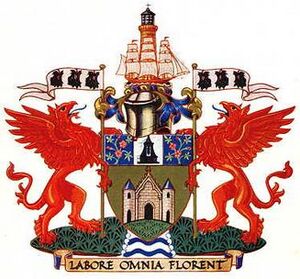
In 1854, a local health board was set up for Eccles. Eccles became a municipal borough in 1892. This meant it had its own local government. In 1933, its area grew to include more land. In 1961, a small part of Eccles was moved to the County Borough of Salford.
In 1974, the borough of Eccles was ended. Its area became part of the City of Salford in Greater Manchester. Today, the Eccles area includes the wards of Barton, Winton, and Eccles.
For national elections, Eccles is now split between two areas. These are Salford and Eccles and Worsley and Eccles South.
Geography of Eccles
Eccles is about 3.7 miles (6 km) west of Manchester. It sits on the north bank of the Manchester Ship Canal. The land gently slopes from 160 feet (49 m) above sea level in the north to 60 feet (18 m) in the south. The ground beneath Eccles is made of sandstone and pebble beds. There are also deposits of clay and loose sands on the surface. These areas, when drained, have good soil for farming.
Some parts of Eccles are in a floodplain, meaning they could flood. Eccles has a mild climate, similar to the rest of Greater Manchester. Temperatures are slightly above the national average. The area gets more rain and a bit less sunshine than the national average.
Population Details
How Many People Live Here?
In 2001, Eccles was part of the Greater Manchester Urban Area. It had a population of 36,610 people. About 17,924 (48.96%) were male and 18,686 (51.04%) were female. The area covered 812 hectares. This means there were about 45 people per hectare. The average age of people in Eccles was 37.
Most people in Eccles were born in England (91.94%). About 2.61% were born elsewhere in the UK. Most people (77.07%) said they were Christian. About 12.05% said they had no religion.
| Eccles compared | ||||
|---|---|---|---|---|
| UK Census 2001 | Eccles | Greater Manchester Urban Area |
England | |
| Total population | 36,610 | 2,244,931 | 49,138,831 | |
| Born outside UK | 5.5% | 7.9% | 9.2% | |
| White | 95.8% | 90.3% | 91.0% | |
| Asian | 2.1% | 6.2% | 4.6% | |
| Black | 0.4% | 1.3% | 2.3% | |
| Over 75 years old | 8.6% | 7.1% | 7.5% | |
| Christian | 77.1% | 72.9% | 72% | |
| Muslim | 2.3% | 5.5% | 3.1% | |
| Source: Office for National Statistics | ||||
| Population change in Eccles from 1901 to 2011 | ||||||||||||
|---|---|---|---|---|---|---|---|---|---|---|---|---|
| Year | 1901 | 1911 | 1921 | 1931 | 1939 | 1951 | 1961 | 1971 | 1981 | 1991 | 2001 | 2011 |
| Population | 34,369 | 41,944 | 44,242 | 44,416 | 41,512 | 43,926 | 43,173 | 38,511 | 37,792 | 36,000 | 36,610 | 38,756 |
|
Municipal Borough 1901–1971 • Urban Subdivision 1981–2011 |
||||||||||||
Population by Area
The Eccles area is made up of three wards: Barton, Winton, and Eccles. In 2001, the Eccles ward had 11,413 people. Winton ward had 12,752 people. Barton ward had 10,434 people. This made the total population for the larger Eccles area 34,599.
Barton ward is one of the most crowded areas in Salford. It has more people over 85 than the city average. Education levels for adults and primary school children are lower here. However, GCSE exam results have improved a lot recently. Some parts of Barton have higher child poverty rates. Almost half the homes in the ward are terraced houses.
Eccles Economy
East of the town centre, the West One retail park opened in 2001. It faced competition from the nearby Trafford Centre. Many shops there were empty for a while. But now, new stores like The Range and Home Bargains have opened. A Morrisons supermarket is also near the town centre.
Eccles still has some manufacturing. Valtris Speciality Chemicals, a chemical supplier, has been on Lankro Way since 1937. They employ over 100 people. Americhem Europe makes colours for plastics and nylon. The CBG Group, an insurance company, has its main office in Eccles. The Morson Group, an employment agency, also has its headquarters here.
Eccles cakes were first sold in the town in 1796. They are now sent all over the world. These cakes are made from flaky pastry, butter, nutmeg, candied peel, sugar, and currants. Some people jokingly call them "dead fly pies."
Important Landmarks
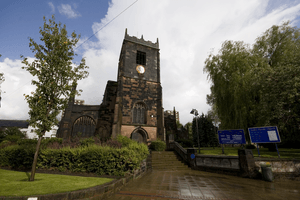
The Parish Church of St Mary the Virgin is the most important historic building in Eccles. It is the only one with a Grade I listing. There are also two Grade II* listed buildings. These are the Church of St Andrew (built in 1879) and Monton Unitarian Church (built in 1875).
The town's war memorial was put up in 1925. It was designed by local sculptor John Cassidy. It is made of Portland stone and has a bronze figure on top. It is now a Grade II listed building.
Eccles Library was built on a site where old, poor quality homes were removed. Andrew Carnegie paid for the building. It was designed by Edward Potts and opened in 1907. It is also a Grade II listed building. Potts hoped it would become "the Eccles University."
Salford City Council wants the Liverpool and Manchester Railway to be a World Heritage Site. Eccles railway station has been restored by the 'Friends of Eccles Railway Station'. They have cleaned it up and improved the garden.
Monton Green and Ellesmere Park are special conservation areas. This means they are protected for their natural beauty.
Transport in Eccles
In 1752, a trust was formed to manage the road from Salford to Warrington. Roads were not very good back then. A journey from Liverpool to Manchester by stagecoach took almost a whole day. Things improved in the 1800s, and more roads were built. In 1832, a daily omnibus (bus) service started from Manchester to Eccles.
The opening of the Liverpool and Manchester Railway in 1830 was a huge event. It was the world's first railway built for both passengers and goods. This marked the end of stagecoach travel and canals as the main way to travel. On the opening day, Eccles was part of an early railway accident. A politician named William Huskisson was hit by a train and later died in Eccles. There have been two other serious train accidents in Eccles, in 1941 and 1984. The Eccles station building was destroyed by fire in 1971 and has not been rebuilt.
Other railway lines were built later, connecting Eccles to places like Wigan and Bolton. However, many of these lines were closed in the 1960s.
The M602 motorway opened in 1971. The local council bought land and moved residents to build this new road. Construction started in 1969. The motorway's path was carefully planned around homes and other important places.
Today, Eccles is served by the Liverpool and Manchester Railway. It also has the Eccles Line of the Metrolink tram system. Trams run every twelve minutes. There are also regular bus services.
Education in Eccles
One of the first schools in Eccles was an 18th-century day school. A Catholic Sunday school opened in the 1800s. The first big school in the area opened on Church Street in 1851.
St Patrick's RC High School is currently the best-performing secondary school in Salford. It has one of the highest scores in England. Eccles has many primary and secondary schools. These include St. Mary's R.C. Primary School and Monton Green Primary School.
Eccles College is a college for older students. It opened in 1973 and offers many courses for school-leavers.
Religion in Eccles
As Eccles grew, the old parish was divided into smaller ones. New churches were built in the surrounding areas. St Andrew's church was built in the 1870s and opened in 1879. It has beautiful stone carvings and stained glass. A school was opened four months after the church.
Roman Catholics in Eccles used to go to a chapel on the de Trafford estate. Later, All Saints' Church was built. The first public Roman Catholic procession in Eccles since the Reformation happened in 1889.
Eccles also has other churches, including a Baptist church. There are also Methodist New Connexion, Wesleyan, and The Salvation Army churches.
Sports in Eccles
The amateur rugby union club Eccles Rugby Football Club was formed in 1881. They joined the RFU in 1887. The club has been playing rugby ever since. They moved to their current ground at Gorton Street in 1948.
The amateur rugby league club Salford City Roosters is also based in Eccles. They were formed in 1977.
West of Eccles is the City of Salford Stadium. This stadium can hold 12,000 people. It is home to the professional Rugby League team Salford Red Devils and the professional Rugby Union team Sale Sharks.
Eccles is also home to the City of Salford Volleyball Club. This is one of England's top women's volleyball teams.
Public Services
Eccles was the first town in England to use a motorized fire engine in 1901. It was made by a local company. Barton Aerodrome, the first public airport in the UK, opened in 1930.
The first power station in Eccles opened in 1896. A much larger one, Barton Power Station, was built in 1920. It supplied electricity to Manchester and the surrounding area. It closed in 1974 and was taken down in 1979.
Salford Royal hospital opened in 1882. It was first a hospital for sick poor people. It was later renamed Hope Hospital and then Salford Royal in 2007.
Famous People from Eccles
Edward Potts was a famous architect born in 1839. He designed many mills in Oldham. He moved to Eccles in 1891 and designed the town's library. He was a local council member and a Justice of the Peace. He started popular Saturday-night concerts. He also gave money to mothers whose babies lived to be one year old. He died in 1909.
The hymn-writer William Cooke was born in Eccles in 1821.
The humanitarian aid worker Alan Henning was from Eccles.
Culture in Eccles
Eccles is most famous for the Eccles cake. These cakes have been made and sold in the town since 1793. They are made with flaky pastry, butter, nutmeg, candied peel, sugar, and currants. They are sold all over the world.
Eccles Wakes were annual holidays to celebrate the Parish Church. They were held for three days, starting after August 25th. This tradition was stopped in 1877.
See also
 In Spanish: Eccles (Gran Mánchester) para niños
In Spanish: Eccles (Gran Mánchester) para niños
 | George Robert Carruthers |
 | Patricia Bath |
 | Jan Ernst Matzeliger |
 | Alexander Miles |


